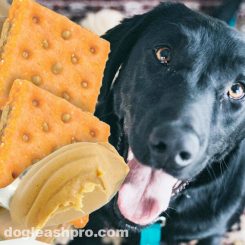
My nephew loves animals and fun snacks like Animal Crackers. He likes to guess each animal before eating them and it is a great learning exercise as well. Since he loves cookies, these cookie-cracker hybrid Animal Crackers are the best snack for him! My dogs love him and always sit by him during his learning exercise in order to try to steal a bite.
Can dogs eat Animal Crackers? No, dogs should not eat Animal Crackers because they contain high amounts of sugar, salt, calories, and carbohydrates. Make sure the Animal Crackers are plain and do not contain chocolate or sweeteners like xylitol. If you must, you can safely share 2 to 3 plain Animal Crackers with your dogs as a rare treat.
Table of Contents
Can dogs have Animal Crackers?
Ideally, dogs should not have Animal Crackers because they are made with ingredients that are not healthy for dogs such as sugar, salt, spice, and the type of oil used. These ingredients can cause weight gain in dogs, diabetes, joint pain, arthritis, heart disease, cancer, and even sodium ion poisoning.
Let’s take a look at the ingredients in Animal Crackers and find out how they may be harmful to our canine friends:
Ingredients in Animal Crackers
- Enriched flour which includes wheat flour, niacin, reduced iron, thiamine mononitrate (Vitamin B1), riboflavin (Vitamin B2), and folic acid.
- Sugar.
- Soybean oil.
- High fructose corn syrup.
- Salt.
- Baking soda for leavening.
- Soy lecithin is used as an emulsifier.
- Natural flavor.
- Spice.
Are Animal Crackers ok for dogs?

Animal Crackers are not ok for dogs. Let’s find out why:
Enriched flour is harmful to dogs with wheat allergies
Wheat flour is one of the main ingredients in Animal Crackers. If your furry family members are sensitive to wheat products or have a wheat allergy, it’s best to keep Animal Crackers away from them.
If you’re not sure whether your pooch has a wheat allergy or not, we highly recommend that you consult with your vet or bring your pup to the vet for a check-up. After a series of tests, your vet will be able to confirm which allergy your pup may have.
Keep in mind that your dog may not be born with a wheat allergy. Most likely constant exposure to wheat products can cause wheat allergy. Signs and symptoms of wheat allergy include:
- Diarrhea.
- Vomiting.
- Bloating.
- Red, itchy, or inflamed skin.
- Skin rashes.
- Sneezing.
- Licking of the paw pads or front paws.
- Itchy bottom causing dogs to drag their bottoms on the floor.
- Asthma.
- Seizure (in severe cases).
Also, dogs do not need wheat flour in their diet. Their diet should consist of meat, vegetables, and dog-friendly grains so that they can get the necessary proteins, carbohydrates, vitamins, minerals, and fats that they need.
Enriched flour or wheat flour is not necessary when it comes to our dog’s diet. Enriched flour is also highly processed and its natural nutrients are lost during the grain to flour processing. That is why they add the necessary nutrients back into the wheat flour such as:
- Niacin (Vitamin B3).
- Reduced iron.
- Thiamine mononitrate (Vitamin B1).
- Riboflavin (Vitamin B2).
- Folic acid (folate or B9).
In all honesty, the nutrients and vitamins from wheat flour are too small of a quantity to be considered beneficial for dogs. Our K9 friends should receive their necessary vitamins and nutrients from their main meal or from dog-friendly snacks instead.
Excessive Sugar consumption can cause health problems in dogs
In just one Animal Crackers, there are 0.4 grams of sugar. While that may not be a lot for us, it is definitely a lot for our canine friends. Keep in mind that dogs are prone to canine periodontal disease. 80% of dogs are affected by this disease by the time they are 3 years of age.
It’s important that dog owners are aware of this and avoid giving their pups sugary food.
Dogs generally receive their sugar intake from carbohydrates. They don’t need any more sugar after that. Regularly consuming sugary food can cause the following health issues in dogs:
- Weight gain which can lead to obesity.
- Dental problems such as loss of enamel, cavities, tooth decay, and tooth loss.
- Diabetes. Type I Diabetes is common in dogs.
- Disruption in metabolism, which leads to low energy levels, lethargy, muscle tone loss, and an increase in fat storage.
For these reasons, it’s best to avoid feeding our canine family members Animal Crackers regularly. If you must, you can feed your K9 pooch just one or two Animal Crackers.
Soybean oil is harmful to dogs with soy allergies
While soybean oil isn’t toxic or harmful to dogs, it does have more saturated fat than other vegetable oils. Saturated fats are not good for our dogs. Additionally, there is plenty of oil that is much better for your dog such as:
- Coconut oil gives your dog a healthy and shiny coat while also moisturizing their skin. Coconut oil is very helpful if your pooch has gut issues. We rub a little bit of coconut oil on our dog’s teeth to help get rid of tartar and plaque buildup. Our Chihuahua loves the taste and her teeth are pearly white.
- Fish oil provides omega-3 fatty acids, which can help soothe skin inflammation caused by allergies, improve your dog’s skin health, and give your dog a shiny coat.
- Sunflower oil contains omega-6 fatty acids, which help promote heart health in dogs. Also, sunflower oil gives your dog a shiny and healthy coat while keeping their skin smooth and moisturized.
- Olive oil can help prevent diabetes and cardiovascular disease in dogs, improve their immune system, and give them shiny and healthy skin and coat. OIive oil contains good fats that your dogs need, but make sure the olive oil you are using is 100% olive oil and not mixed with other types of oil.
- Flaxseed oil is a great substitute if your furry friends are allergic to fish oil. Flaxseed oil eases inflammation in dogs so it acts as allergy relief. If your pooch has arthritis, kidney problems, or high blood pressure, try using flaxseed oil.
There are plenty of oils that are canine-friendly and soybean oil is not one of them. Soybean oil is also harmful to dogs that are allergic to soy products. For these reasons, it’s best to consider dog treats that use one of the above oils instead of soybean oil.
Fun Fact: Many popular cracker snacks like Cheez-Its contain soybean oil. Check out our article, Can Dogs Eat Cheez Its to find out if this cheese cracker snack is safe for doggy consumption.
High fructose corn syrup is sugar that your dogs don’t need
High fructose corn syrup has a very high sugar level. If your pooch regularly ingests large amounts of sugar or sugary food, they are at risk for diabetes and obesity. Additionally, they will have dental issues.
Corn syrup generally has a high glycemic index which means that the carbohydrates in the food are digested easily and quickly. As a result, your pooch will experience a quick spike in energy level that is followed by a quick crash. This is not good for our furry friends. Also, corn syrup does not provide any nutritional benefits to dogs.
It’s best to feed our K9 pals low glycemic index food because the carbohydrates are slow to digest and the energy that is absorbed is sustained for a longer period of time.
Additionally, sugary snacks can be addicting and when our pups are addicted to food with sweeteners like high fructose corn syrup, it may not be easy to get them to eat healthier food. It’s best to avoid sugar addiction in the first place.
Excessive Salt consumption can cause sodium poisoning in dogs
There is 7 mg of salt in one Animal Cracker. While that isn’t much for us, that is considered a lot for our pooch. In general, dogs only require 0.25 grams to 1.5 grams of salt per 100 grams of food. The amount of sodium your dogs need daily should come from their main meal or regular dog food, not from human snacks like Animal Crackers.
Feeding your pooch too many Animal Crackers can cause salt poisoning with signs and symptoms that include:
- Frequent urination due to excessive thirst. Make sure to provide a bowl of fresh water if your dog consumes more than a few Animal Crackers.
- Lips, mouth, and tongue may swell up.
- Vomiting.
- Diarrhea and watery stool.
- Loss of appetite.
- Nausea.
- Headache.
- Dizziness.
- Muscle weakness, tremors, and spasms.
- Increased heart rate.
- Convulsions.
- Excessive drooling.
- Lethargy.
Baking soda for leavening is not necessary for dogs
A dog’s diet does not require baking soda. It is also not a good idea to give your dog baking soda. Dogs that ingest a little bit of baking soda should be fine, but if your pooch consumes a large amount of it, a trip to the vet is necessary.
Soy lecithin is used as an emulsifier and is harmful to dogs with soy allergies
In general, lecithin is fine for dogs since it aids in digestion, vitamin absorption, and immunity. Lecithin is great for both young and older dogs. In younger dogs, lecithin can help with learning and memory. Lecithin can also soothe skin inflammation and irritations in senior dogs.
However, soy lecithin may be harmful to dogs with soy allergies. If your pooch is allergic to soy, do not feed them food that contains soy lecithin.
Many argue that soy lecithin is a killer ingredient in pet food and it is a waste product. It is said that if you can’t pronounce an ingredient on the nutritional label, most likely it is not good.
Did you know? Zesta Saltine Crackers also contain soy lecithin. Check out Can Dogs Eat Saltine Crackers to find out if Saltine Crackers are good for dogs.
Spices such as nutmeg and mace are harmful to dogs in large quantities
Nutmeg and mace spices are added to Animal Crackers to give these cookie-cracker hybrids their distinct flavor.
Nutmeg spice is harmful to dogs in large amounts. In general, it’s best to keep nutmeg or nutmeg spices away from dogs because it contains a toxin called myristicin. contain myristicin. It’s unclear how much nutmeg spice is in Animal Crackers but about 5 grams of the nutmeg spice is considered toxic to dogs.
Too much nutmeg consumption can cause the following in dogs:
- Dehydration and frequent urination.
- Upset stomach.
- Increased heart rate.
- Seizures.
- High blood pressure.
- Disorientation.
- Disruption in the nervous system.
Mace is a spice that is derived from the same plant as nutmeg so it is also not safe for dogs either. For these reasons, it’s best to feed your pooch 2 to 3 Animal Crackers at most.
Are Animal Crackers bad for dogs?

From the ingredient list above, it’s very clear now that Animal Crackers are made for human consumption and not for our canine friends. Let’s also take a look at the nutritional profile of one Animal Cracker and see why they are bad for dogs.
| Name, Unit | Amount |
| Calories, cal | 8 |
| Total Fat, g | 0.1 |
| Sodium, mg | 7 |
| Total Carbohydrate, g | 1.5 |
| Dietary Fiber, g | < 0.1 |
| Total Sugars, g | 0.4 |
| Protein, g | 0.1 |
| Iron, mg | < 1 |
This means that a single Animal Cracker has 8 calories, 0.1 grams of fat, and 1.5 grams of carbohydrate (0.4 grams of sugar). So in one Animal Cracker, 78.7% is carbohydrates and 14.8% is fat with only 6.6% in protein. Your pooch may consume way too many carbs and fat as a result of eating Animal Crackers.
Are Animal Crackers safe for dogs?
While Animal Crackers are not toxic to dogs, it doesn’t mean that we should share this human snack with them. As mentioned above, Animal Crackers are not healthy for our four-legged friends since they are packed full of carbs, salt, and sugar. Animal Crackers are also high in calories.
If you must, you can give your Fido two or three plain Animal Crackers as a rare occasional treat and no more than that.
Feeding our furry friends more than three Animal Crackers regularly or daily can cause weight gain in dogs and cause a host of other health issues in dogs such as heart disease, diabetes, arthritis, joint pain, cancer, and even pancreatitis.
For these reasons, while Animal Crackers are not harmful or toxic to our dogs, we should still avoid feeding them this human snack.
Are Animal Crackers good for dogs?
No, Animal Crackers are not good for dogs. That’s because if we take a look at the ingredients in Animal Crackers, we can see that there is a list of ingredients that are not healthy or safe for doggy consumption.
There are two types of sugar that are used to make Animal Crackers: sugar and high fructose corn syrup. Both of these would only harm your dog’s health. Regularly allowing your dogs to eat Animal Crackers would cause them to gain weight, have dental issues like tooth decay and poor gum health, diabetes, and even a disruption in metabolism.
If your dog consumes too many Animal Crackers, he may immediately start to have an upset stomach.
So, can dogs eat Animal Crackers?
Ideally, our four-legged friends should not eat Animal Crackers. They are high in carbs, fats, sugar, and salt which is unhealthy for dogs. Occasionally eating two or three Animal Crackers as a rare treat is fine, but regular consumption is bad.
Our dog’s health heavily depends on the food they eat and their active lifestyle. If you have a small dog breed or an inactive dog, it’s best to keep Animal Crackers away from them. As you can see, unhealthy snacks or food can easily impact a small dog’s health.
Our canine friends will eat anything and everything you give them, even food that’s not healthy or safe for them. Thus, it’s important that dog owners do not feel guilty for not sharing their snacks with their pooch.
DISCLAIMER: THIS WEBSITE DOES NOT PROVIDE MEDICAL ADVICE
The information, including but not limited to, text, graphics, images and other material contained on this website are for informational purposes only. No material on this site is intended to be a substitute for professional veterinary advice, diagnosis, or treatment. Always seek the advice of your veterinarian or other qualified health care provider with any questions you may have regarding dietary needs.
Resources:
https://en.wikipedia.org/wiki/Animal_cracker
https://culinarylore.com/food-history:when-did-barnums-animal-crackers-come-out/

With over five years of specialized experience as an animal writer, my expertise lies in dog nutrition, health, behavior, grooming, and training. I am dedicated to delivering helpful and informative content that caters to the well-being of our furry friends. My primary goal is to empower pet owners with knowledge and ensure our canine companions thrive in health and happiness. In my free time, I love volunteering at local dog rescue centers.







